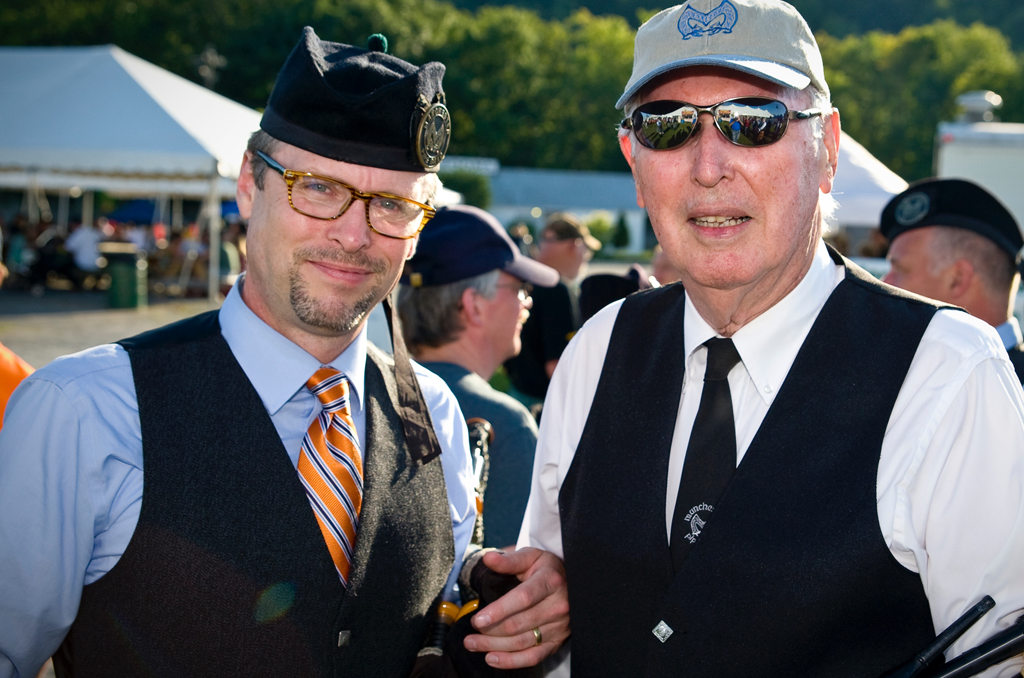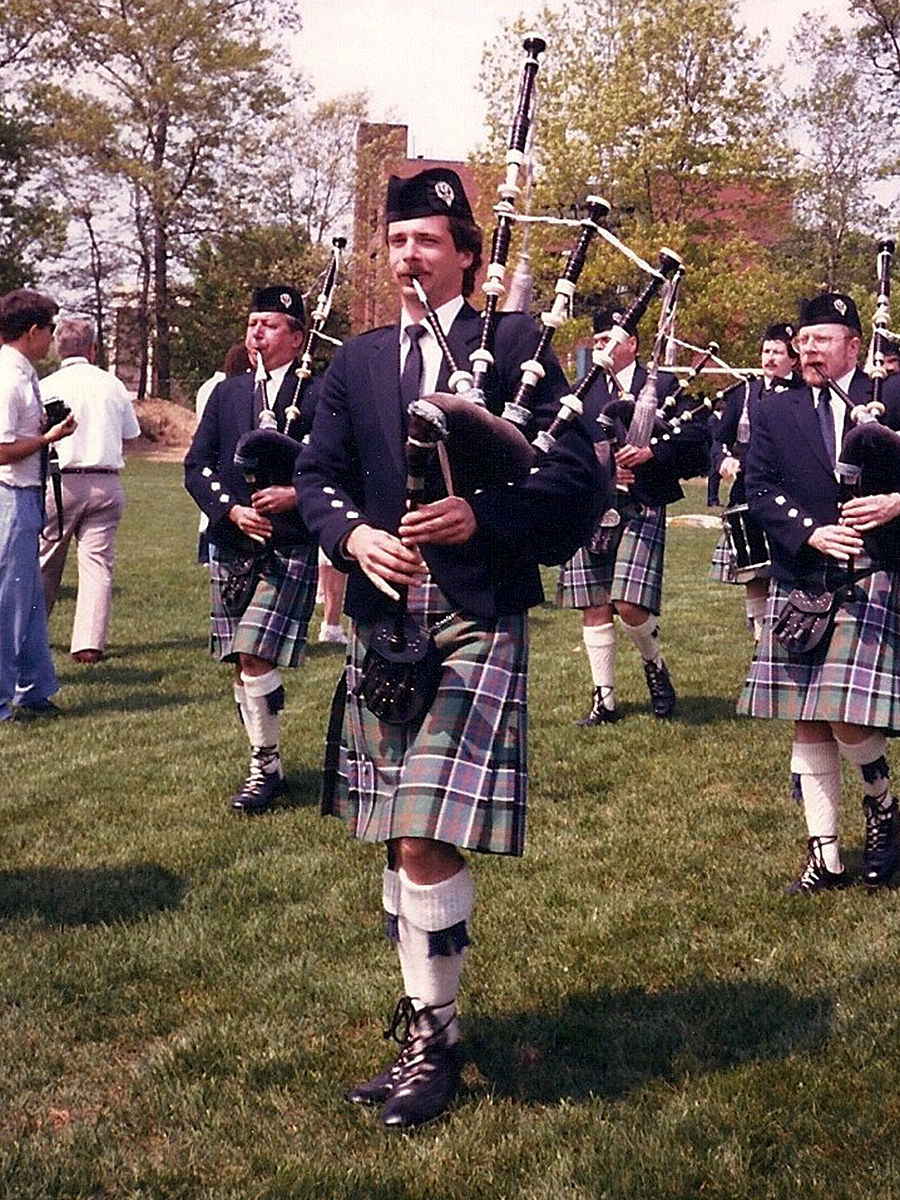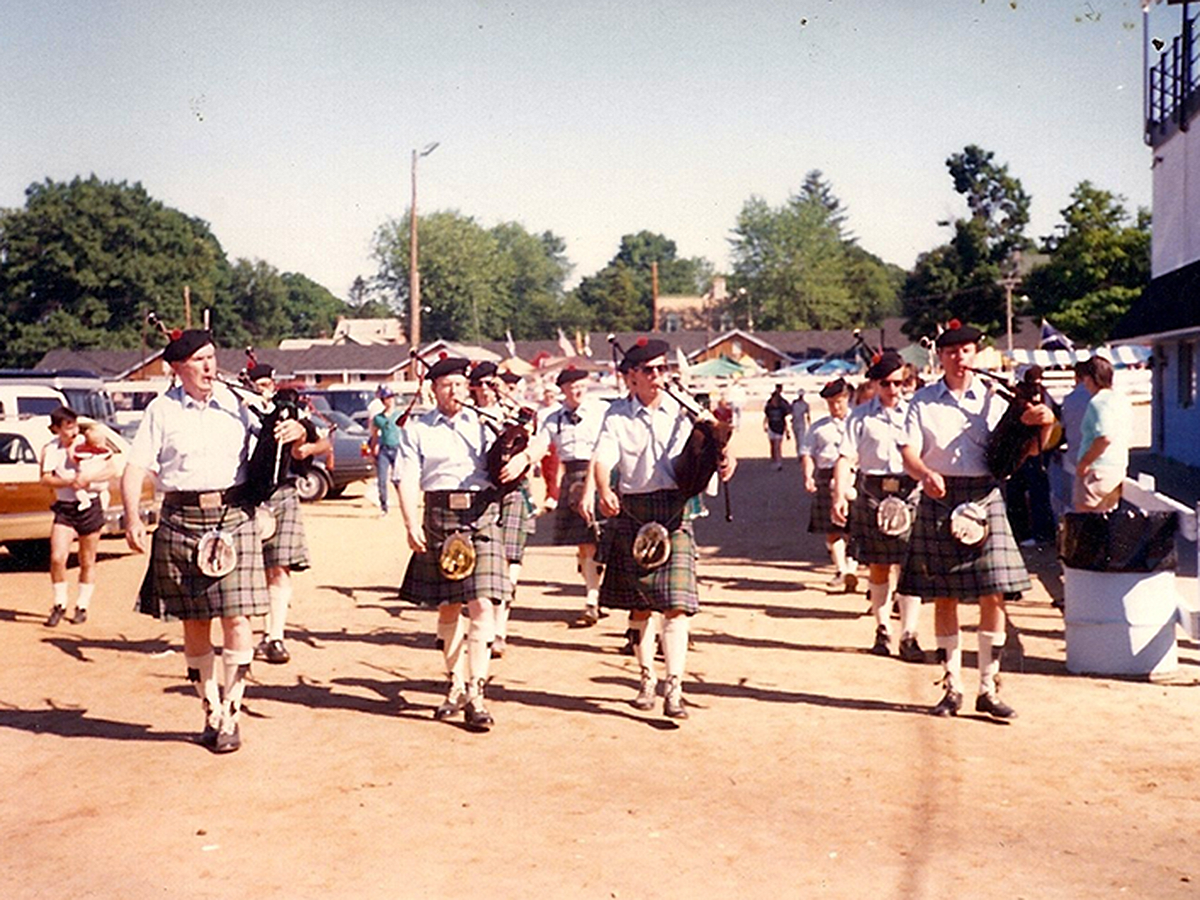Our History
Founded in 1914 in Manchester, Connecticut, by Scottish and Irish families, many of whom emigrated to work in the community's textile industry, the Manchester Pipe Band is one of the oldest pipe bands in the United States.
The band began as a dream in the mind of a few men in the days prior to World War I. The dream was inspired by a visit to Manchester by the Holyoke Pipe Band, playing in the local Orangemen’s Parade. A group of men set on the task of creating a pipe band in Manchester, regardless of the fact that there were no accomplished pipers in Manchester at the time. The Pipe Major of the Holyoke band, Alex Scott, offered to instruct this new band, and traveled by street car to Manchester to give lessons. Within a year, the band made its first public appearance on October 31, 1914, despite not yet having uniforms. Over the next year, thanks to some serious fund raising efforts, the band was able to turn out in the full dress uniform of the Seaforth Highlanders, and, they were on their way. For the next forty plus years, the band played in many different types of events, parades and concerts.
The band was always admired for their "spit and polish". They were even honored by being invited to visit the White House in 1950, during Harry Truman's presidency.
In 1964, Charles “Chuck” Murdoch joined the band, and, soon became Pipe Major. Under Chuck’s leadership, the band prospered in competition. Chuck has always been one of the top instructors in this country, and, many of his students have gone on to be very good soloists and band pipers. Chuck is also regarded as one of the nicest and most respectable people in the pipe band scene.

Chuck is originally from Michigan. His first instructor was Alec Matheson, but, his biggest influence was from lessons with George Duncan in Detroit. George was from Scotland, was PM of the Ford Pipe Band, and a top soloist and a judge. With Chuck as its new Pipe Major, the band moved in a new direction, and became one of the top competing U.S. pipe bands for many years to come.

At first, the band was able to help bolster its ranks with players who, with the help of other band members, were able to emigrate from Scotland to find employment in the silk mills and machine shops in Connecticut. This was a practice employed by Manchester, Worcester and a few other bands in the earlier days of pipe band competition. This was particularly helpful to the drum corps, as Drew Nisbet came and began to build up the band’s corps.
The band began to prosper in Grade II throughout the Eastern U.S. and Canada, winning numerous awards. In 1977, the band journeyed to Aberdeen, Scotland for the World Pipe Band Championships, and, was given the award of “Best Overseas Pipe Band”. Under Pipe Major Murdoch, the Manchester Pipe Band had a profound impact on many other bands in the Northeastern U.S. Murdoch’s unmatched talent at setting up the band caused many bands to try to emulate the Manchester sound. He was revered for a leadership style which helped to keep band members dedicated and committed to the betterment of the band.
In 1977, the band journeyed to Aberdeen, Scotland for the World Pipe Band Championships, and, was given the award of “Best Overseas Pipe Band”.
The 1980’s were a very successful period for the band. It was also a time when pipe band members started to be more mobile. With more success, and, PM Murdoch’s leadership, the band was drawing more players from all around the Northeast. Soon, there were very few members who were actually from the Manchester area. Players were travelling three hours or more to band practice. The EUSPBA was also growing, and, in 1986, decided to create a Grade One for bands and, shift up some of the better bands in Grade II to Grade I. Based upon their success in Grade II, the Manchester Pipe Band was one of the bands upgraded to the top tier. Manchester won the Grade I Northeast Pipe Band Championships twice after that move was made. Eventually, the bands who had been moved to Grade I were placed back into Grade II when it was realized that they were not competitive with the top Grade I bands in Canada and Scotland.

In 1995, with the band still growing, a plan was put into place to again go to the World Championships to compete against the top Grade II bands in the world. While the band finished in the middle of the pack overall, the drum corps, under Drum Sergeant Scott Armit, won the trophy as the Grade II Champion Drum Corps! In September of the following year, the band travelled to the Capital District Scottish Games, near Schenectady, N.Y. Because Manchester was the only Grade II band that day, and, Simon Fraser, as guest band, was the only Grade One band, an open MSR contest was held between the two bands. When the dust had cleared, SFU had won, but, the Manchester Drum Corps (again under Scott Armit), had been judged first that day, and, the pipe corps was widely praised for being right up there with SFU!
Chuck Murdoch stepped down after his highly successful run as pipe major in the Fall of 1996. Pipe Sergeant Brian Green took over and led the band for a season. Brian was followed by Mike MacNintch, who led a very successful Grade IV version of the band for a couple of years. The band was upgraded to Grade III, and, Brian Green began his second stint at Pipe Major. During Green’s second run, the band was upgraded from Grade III to Grade II. Brian led the band through five successful seasons in Grade II. Brian moved on to play with the 78th Frasers. Since then, the band has had several pipe majors – James Lundt, Tom Burnham, Jared Otto, and now Dan Pisowloski. Gordon Bell is the current Drum Sargent and drum instructor.
The family that plays together stays together would be one way to describe Manchester’s longevity. Below is a list of the families which have had multiple members in the band through the years (with apologies to anyone who was inadvertently left out): Allely, Bell, Campbell, Cawley, Dickerson, Dixon, Duncan, Forbes, Green, Hanks, Hanley, Henningham, Ingraham, Jones, Kenyon, King, Lazaroff, Lundt, Lynch, McGonigal, Nisbet, Otto, Phillips, Rankin, Ritchie, Sloan, Stevenson, Stroh, Sullivan, Taggart, Trueman, Warner.
Having operated continuously since its founding, Manchester Pipe Band is one of the nation's oldest continuously active bagpipe bands. The band has an active year-round schedule of events consisting of musical competitions, public and private performance, and instruction in traditional Scottish music.
